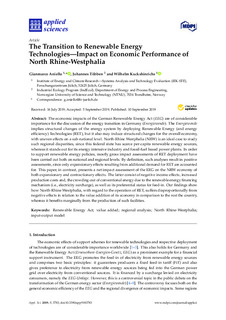| dc.contributor.author | Aniello, Gianmarco | |
| dc.contributor.author | Többen, Johannes Reinhard | |
| dc.contributor.author | Kuckshinrichs, Wilhelm | |
| dc.date.accessioned | 2020-02-18T10:39:40Z | |
| dc.date.available | 2020-02-18T10:39:40Z | |
| dc.date.created | 2019-10-21T17:43:20Z | |
| dc.date.issued | 2019 | |
| dc.identifier.issn | 2076-3417 | |
| dc.identifier.uri | http://hdl.handle.net/11250/2642232 | |
| dc.description.abstract | The economic impacts of the German Renewable Energy Act (EEG) are of considerable importance for the discussion of the energy transition in Germany (Energiewende). The Energiewende implies structural changes of the energy system by deploying Renewable Energy (and energy efficiency) Technologies (RET), but it also may induce structural changes for the overall economy, with uneven effects on a sub-national level. North-Rhine Westphalia (NRW) is an ideal case to study such regional disparities, since this federal state has scarce per-capita renewable energy sources, whereas it stands out for its energy intensive industry and fossil-fuel based power plants. In order to support renewable energy policies, mostly gross impact assessments of RET deployment have been carried out both on national and regional levels. By definition, such analyses result in positive assessments, since only expansionary effects resulting from additional demand for RET are accounted for. This paper, in contrast, presents a net impact assessment of the EEG on the NRW economy of both expansionary and contractionary effects. The latter consist of negative income effects, increased production costs and, the crowding-out of conventional energy due to the renewable energy financing mechanism (i.e., electricity surcharge), as well as its preferential status for feed-in. Our findings show how North-Rhine Westphalia, with regard to the operation of RET, suffers disproportionally from negative effects in relation to the value addition of its economy in comparison to the rest the country, whereas it benefits marginally from the production of such facilities. | nb_NO |
| dc.language.iso | eng | nb_NO |
| dc.publisher | MDPI | nb_NO |
| dc.rights | Navngivelse 4.0 Internasjonal | * |
| dc.rights.uri | http://creativecommons.org/licenses/by/4.0/deed.no | * |
| dc.title | The transition to renewable energy technologies-Impact on economic performance of North Rhine-Westphalia | nb_NO |
| dc.type | Journal article | nb_NO |
| dc.type | Peer reviewed | nb_NO |
| dc.description.version | publishedVersion | nb_NO |
| dc.source.volume | 9 | nb_NO |
| dc.source.journal | Applied Sciences | nb_NO |
| dc.source.issue | 18 | nb_NO |
| dc.identifier.doi | 10.3390/app9183783 | |
| dc.identifier.cristin | 1739252 | |
| dc.description.localcode | © 2019 by the authors. Licensee MDPI, Basel, Switzerland. This article is an open access article distributed under the terms and conditions of the Creative Commons Attribution (CC BY) license (http://creativecommons.org/licenses/by/4.0/). | nb_NO |
| cristin.unitcode | 194,64,25,0 | |
| cristin.unitname | Institutt for energi- og prosessteknikk | |
| cristin.ispublished | true | |
| cristin.fulltext | original | |
| cristin.qualitycode | 1 | |

